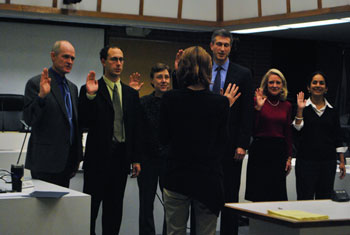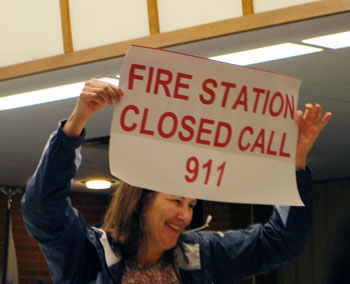Pre-Thanksgiving Council Pre-Heats Oven
Ann Arbor city council meeting (Nov. 19, 2012): The first meeting of the council’s new edition featured delaying action on two main agenda items – revisions to the Ann Arbor living wage ordinance, and two competing proposals about the city’s public art ordinance.

The newly elected members of council are sworn in by city clerk Jackie Beaudry (back to camera). From left: mayor John Hieftje, Chuck Warpehoski (Ward 5), Margie Teall (Ward 4), Christopher Taylor (Ward 3), Sally Petersen (Ward 2) and Sumi Kailasapathy (Ward 1). (Photos by the writer.)
Legislative activity on the public art ordinance resulted from the Nov. 6 rejection by voters of an alternate means of funding public art – a 0.1 mill tax that would have generated roughly $450,000 annually. At the Nov. 19 meeting, Jane Lumm (Ward 2) proposed ending the existing public art program, which requires that 1% of the budget for all capital projects in the city be allocated for public art – with a limit of $250,000 per project. A competing proposal, from Sabra Briere (Ward 1), would narrow the type of capital project from which Percent for Art funds could be allocated. Briere’s proposal would have the practical effect of reducing – by about 90% – the amount of public art funds generated by the existing program. In the last two years the program has generated over $300,000 a year, and more in previous years.
The council wound up tabling both proposals, a parliamentary move that means there’s no particular time in the future when the council must consider them. The proposals will expire, if the council does not take them up off the table in six months. However, the council’s strategy will likely be to appoint a committee to study the matter and to suspend temporarily the existing program. A resolution to that effect was added to the council’s agenda during the meeting, after the tabling of the other proposals – but that third resolution was then postponed until the council’s Dec. 3 meeting.
Also postponed was a set of revisions to the city’s living wage ordinance. The main change would be to exempt those nonprofits from the ordinance that receive funding through the city’s human services allocation, which has totaled roughly $1.2 million each year for the last several years. The ordinance currently has a waiver provision, requiring a city-council-approved plan for compliance with the living wage ordinance within three years. Only one such waiver has been sought since the living wage ordinance was enacted in 2001. That came at the council’s meeting earlier this month, on Nov. 8, 2012.
Based on council deliberations at the Nov. 19 meeting, the living wage revisions in their current form seem likely to be approved only with great difficulty. Some councilmembers seemed more interested in pursuing exemptions for categories of workers – temporary or seasonal – instead of exempting categories of organizations. The living wage ordinance revisions were postponed until Feb. 19.
Getting initial approval were changes to two other city ordinances – on noise and the storage of cars on streets.
The changes to the noise ordinance were prompted by the impact that recent construction of the Landmark building at 601 S. Forest had on neighbors. If given final approval by the council, the changes would make clear that holidays are to be treated like Sundays and that supervisors can be cited under the ordinance, not just a worker who’s operating a piece of equipment.
The revision to the towing ordinance would make it easier to prevent people from storing inoperable vehicles on city streets. Like all changes to city ordinances, it will need a second vote by the council, after a public hearing.
In other business, the council authorized a $15,000 budget for analyzing alternatives for installing a sidewalk along a section of Scio Church Road. Residents in the area have petitioned the city for a sidewalk.
And Stephen Kunselman (Ward 3) used his communications time toward the end of the meeting as an occasion to deliver harsh criticism of the Ann Arbor Transportation Authority and mayor John Hieftje.
In the first meeting for newly elected councilmembers, the council also chose Marcia Higgins (Ward 4) to serve as mayor pro tem, as she has for the last three years. The order of succession to the mayor, based on seniority lines, was also set. [Full Story]




